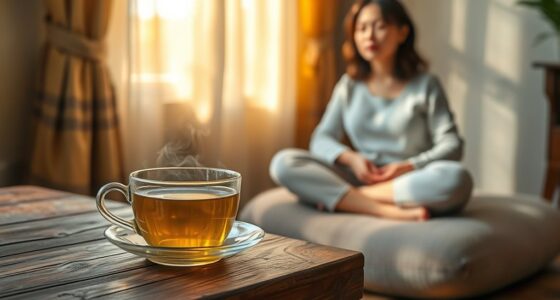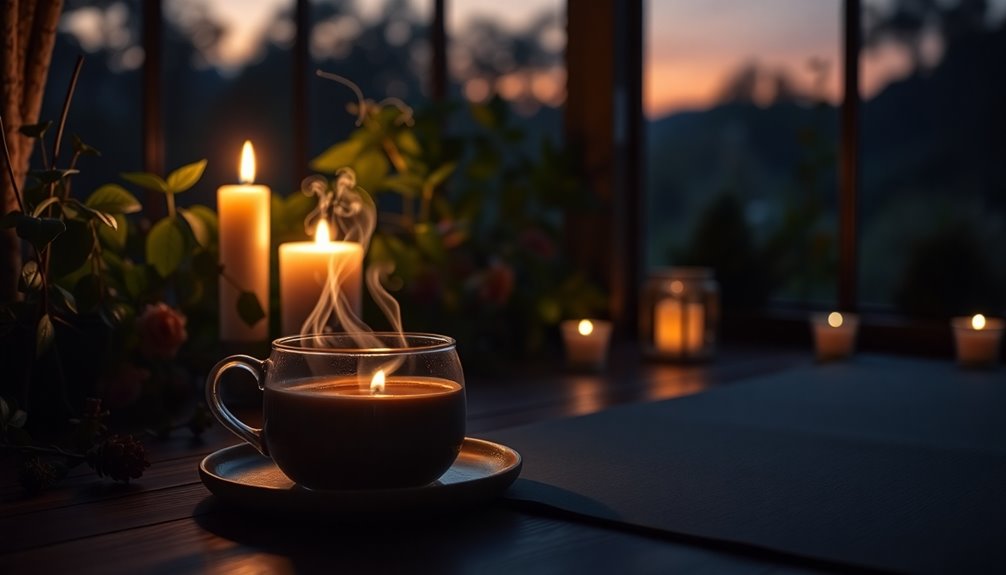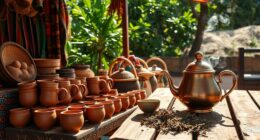Pairing tea rituals with your daily meditation is a wonderful way to enhance tranquility. Begin by choosing a calming herbal tea, like chamomile or lavender. As you prepare your tea, focus on the sounds of boiling water and the colors of the tea leaves. Inhale the aroma and feel the warmth of your cup, grounding yourself in the moment. Savor each sip, allowing the flavors to soothe your mind. Consider exploring different cultural traditions, like the Japanese tea ceremony, for added mindfulness. Engaging in these rituals can deepen your practice, and there's so much more to discover!
Key Takeaways
- Choose calming herbal teas like chamomile or lavender to enhance relaxation and mindfulness during meditation.
- Incorporate a mindful tea preparation ritual to ground yourself and focus on the present moment.
- Engage fully with the sensory experience of tea by observing colors, aromas, and flavors while steeping and sipping.
- Establish a routine that combines tea drinking with meditation to promote mental clarity and reduce stress over time.
- Respect cultural traditions by learning about the origins of the tea rituals you practice to honor their significance.
Introduction

Incorporating tea rituals into your meditation practice can transform your experience, creating a deeper sense of mindfulness and tranquility. When you engage in a tea ritual before meditation, it helps ground you, making it easier to focus and be present. Think about selecting your favorite tea blends—ones that calm or energize you. This mindful preparation sets the right intention for your meditation.
As you prepare your tea, take a moment to enjoy the aroma and warmth. Savoring your tea can enhance your awareness, pulling you into the present moment. The flavors of the tea invite you to pause and appreciate the little things around you. This sensory experience encourages deeper introspection and relaxation. Regularly combining tea rituals with meditation can also help reduce stress. You'll find that this practice promotes mental clarity and nurtures a greater sense of gratitude for each moment. Additionally, choosing herbal teas, which are known for their calming effects, can further enhance your relaxation and mindfulness during meditation.
Tea's Calming Historical Significance

Tea has long held a revered place in various cultures, especially in Asia, where it's seen as more than just a beverage—it's a gateway to mindfulness and social connection.
The Japanese tea ceremony, known as "Chanoyu," highlights this beautifully. It encourages you to embrace calmness and presence, as you prepare and enjoy tea with great care.
In Chinese culture, tea has a rich history as a medicinal drink, offering health benefits that enhance well-being. Oolong tea, for instance, is recognized for its antioxidant properties that contribute to overall health. Sharing tea fosters harmony and respect among guests, showing how interconnectedness strengthens community bonds.
Ancient Buddhist monks recognized tea's calming effects too. They often used it to enhance meditation practices, as its soothing qualities help clear the mind.
When you brew and share tea, you're participating in a tradition that symbolizes hospitality and respect. This ritual can create a peaceful atmosphere, allowing you to connect deeply with others or yourself. Additionally, incorporating honey, such as Manuka honey, can elevate your tea experience by providing health benefits that support your immune system and overall well-being.
Tea Enhances Mindfulness Practice

By engaging in tea meditation, you can enhance your mindfulness practice significantly. This beautiful ritual encourages you to focus on the sensory experience of preparing and drinking tea, helping you stay present in the moment.
Start by boiling water and notice the sound it makes. As the water heats, take a moment to observe the color changes in your tea leaves. This simple act grounds you, pulling your thoughts back to the present moment.
When you pour the tea, inhale its delightful aroma, feeling the warmth of the cup in your hands. As you sip, savor the flavors and the sensation of the tea flowing through you.
This process can calm your mind, reducing stress and anxiety while fostering emotional clarity. Drinking tea becomes not just a daily routine but a comforting medium for reflection.
Cultural Tea Traditions Worldwide

Across the globe, various cultures celebrate tea through unique rituals that reflect their values and traditions.
In Japan, the Japanese tea ceremony, known as "chanoyu," emphasizes mindfulness and simplicity. Here, you prepare and sip tea carefully, creating a peaceful moment for your mind and body.
In China, the Gongfu tea ceremony showcases the artistry of brewing. You enjoy multiple infusions, allowing the unique flavors of high-quality teas to shine. This connection deepens your appreciation for the beverage in your daily life.
Tibetan tea traditions offer a different experience, incorporating butter and salt to create a nourishing drink. This tea not only supports your body at high altitudes but also serves as a communal ritual, bringing people together.
In England, afternoon tea combines social interaction with delicious treats like scones and pastries, highlighting the joy of sharing a cup of tea.
Finally, the Moroccan tea ceremony focuses on hospitality. You brew mint tea and pour it from a height, creating a delightful experience full of flavor and friendship.
Each of these cultural traditions enriches your tea experience and enhances your meditation practice!
Cultural Appropriation in Tea Rituals

Understanding the nuances of cultural appropriation in tea rituals is essential for fostering respect and appreciation. When you adopt practices from another culture without understanding their significance, it can lead to misrepresentation and commodification.
It's important to recognize that tea holds a rich history in various cultures, especially in Asian traditions, where specific rituals carry deep meaning.
Engaging in tea rituals without acknowledging their origins might contribute to cultural erasure. This undermines the practices of communities that cherish these rituals as sacred.
To truly honor the beauty of tea traditions, approach them with respect. Seek to learn about their cultural significance and engage with practitioners from those cultures.
Practical Applications

Incorporating a tea ritual into your daily routine can transform your meditation practice and create a calming sanctuary amidst life's chaos. Start by setting aside 30 minutes each day for an undisturbed tea time. Choose your tea based on how you feel—if you're tired, opt for a calming herbal blend, or if you need focus, pour the water over some energizing loose-leaf green tea.
As you prepare, pay attention to the little things. Listen to the water boiling, and breathe in the delightful aroma of the steeping leaves. This mindfulness helps anchor your awareness in the present moment.
Once your tea is ready, take a moment to feel the warmth of the cup in your hands. Sip slowly and enjoy each taste. The traditional tea ceremony can serve as inspiration for creating a deeper connection with your tea ritual.
You can also engage in gentle activities while you drink tea, like journaling or light crafting. Reflect on any insights you gain during this time, allowing the calmness from your tea ritual to carry into your daily life.
Frequently Asked Questions
What Tea Helps With Meditation?
When you're seeking tea to enhance meditation, consider herbal options like Holy Basil for calmness, Jasmine Green Tea for relaxation, or Chai for warmth. Each supports your practice, deepening focus and emotional stability.
Should You Drink Tea Before or After Meditation?
You should drink tea before meditation to promote relaxation and focus. Caffeine-free options like chamomile or rooibos can enhance your calm state. Afterward, sipping tea can ground you and deepen your reflective experience.
How to Start a Tea Ritual?
To start a tea ritual, carve out 30 minutes in a quiet space. Choose your tea based on your mood, prepare mindfully, and savor each step, connecting deeply with the experience and the present moment.
What Is a Spiritual Tea Ceremony?
A spiritual tea ceremony's a mindful practice where you prepare and drink tea intentionally. You engage your senses, reflect silently, and cultivate connection, fostering inner peace and deeper self-understanding through this beautiful ritual.
Conclusion
Incorporating tea rituals into your daily meditation can truly enhance your practice. By sipping your favorite tea, you can connect with its calming history and embrace mindfulness. Remember to explore different cultural traditions, while being mindful of respect and appreciation. So, next time you sit down to meditate, brew a cup of tea and enjoy the soothing experience it brings. You'll find that this small addition can make a big difference in your journey toward peace and calm.










